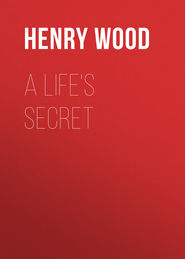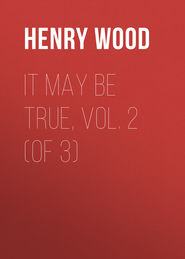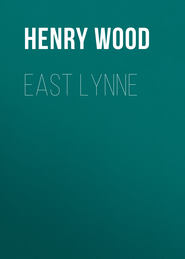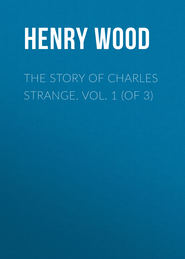По всем вопросам обращайтесь на: info@litportal.ru
(©) 2003-2024.
✖
The Story of Charles Strange. Vol. 2 (of 3)
Настройки чтения
Размер шрифта
Высота строк
Поля
"You may be very sure of that," he emphatically answered. "Let there be peace between us, at any rate, my dear wife. The clouds will pass away in time."
On the Monday morning following, Lord and Lady Level departed for London. The peace, patched up between them, being honestly genuine and hopeful on his lordship's part, but doubtful on that of my lady.
Still nothing had been said or done to lift the mystery which hung about Marshdale.
CHAPTER III.
ONE NIGHT IN ESSEX STREET
We go on now to the following year: and I, Charles Strange, take up the narrative again.
* * * * *
It has been said that the two rooms on the ground-floor of our house in Essex Street were chiefly given over to the clerks. I had a desk in the front office; the same desk that I had occupied as a boy; and I frequently sat at it now. Mr. Lennard's desk stood opposite to mine. On the first floor the large front room was furnished as a sitting-room. It was called Mr. Brightman's room, and there he received his clients. The back room was called my room; but Mr. Brightman had a desk in it, and I had another. His desk stood in the middle of the room before the hearthrug; mine was under the window.
One fine Saturday afternoon in February, when it was getting near five o'clock, I was writing busily at my desk in this latter room, when Mr. Brightman came in.
"Rather dark for you, is it not, Charles?" he remarked, as he stirred the fire and sat down in his arm-chair beside it.
"Yes, sir; but I have almost finished."
"What are you going to do with yourself to-morrow?" he presently asked, when I was putting up my parchments.
"Nothing in particular, sir." I could not help sometimes retaining my old way of addressing him, as from clerk to master. "Last Sunday I was with my uncle Stillingfar."
"Then you may as well come down to Clapham and dine with me. Mrs. Brightman is away for a day or two, and I shall be alone. Come in time for service."
I promised, and drew a chair to the fire, ready to talk with Mr. Brightman. He liked a little chat with me at times when the day's work was over. It turned now on Lord Level, from whom I had heard that morning. We were not his usual solicitors, but were doing a little matter of business for him. He and Blanche had been abroad since the previous November (when they had come up together from Marshdale), and had now been in Paris for about a month.
"Do they still get on pretty well?" asked Mr. Brightman: for he knew that there had been differences between them.
"Pretty well," I answered, rather hesitatingly.
And, in truth, it was only pretty well, so far as I was able to form a judgment. During this sojourn of theirs in Paris I had spent a few days there with a client, and saw Blanche two or three times. That she was living in a state of haughty resentment against her husband was indisputable. Why or wherefore, I knew not. She dropped a mysterious word to me now and then, of which I could make nothing.
While Mr. Brightman was saying this, a clerk came in, handed a letter to him and retired.
"What a nuisance!" cried he, as he read it by fire-light. I looked up at the exclamation.
"Sir Edmund Clavering's coming to town this evening, and wants me to be here to see him!" he explained. "I can't go home to dinner now."
"Which train is he coming by?" I asked.
"One that is due at Euston Square at six o'clock," replied Mr. Brightman, referring to the letter. "I wanted to be home early this evening."
"You are not obliged to wait, sir," I said. I wished to my heart later—oh, how I wished it!—that he had not waited!
"I suppose I must, Charles. He is a good client, and easily takes offence. Recollect that breeze we had with him three or four months ago."
The clocks struck five as he spoke, and we heard the clerks leaving as usual. I have already stated that no difference was made in the working hours on Saturdays in those days. Afterwards, Mr. Lennard came up to ask whether there was anything more to be done.
"Not now," replied Mr. Brightman. "But I tell you what, Lennard," he added, as a thought seemed to occur to him, "you may as well look in again to-night, about half-past seven or eight, if it won't inconvenience you. Sir Edmund Clavering is coming up; I conclude it is for something special; and I may have instructions to give for Monday morning."
"Very well," replied Lennard. "I will come."
He went out as he spoke; a spare, gentlemanly man, with a fair complexion and thin, careworn face. Edgar Lennard was a man of few words, but attentive and always at his post, a most efficient superintendent of the office and of the clerks in general.
He left and Mr. Brightman rose, saying he would go and get some dinner at the Rainbow. I suggested that he should share my modest steak, adding that Leah could as easily send up enough for two as for one: but he preferred to go out. I rang the bell as I heard him close the frontdoor. Watts answered it, and lighted the gas.
"Tell your wife to prepare my dinner at once," I said to him; "or as soon as possible: Mr. Brightman is coming back to-night. You are going out, are you not?"
"Yes, sir, about that business. Mr. Lennard said I had better go as soon as I had had my tea."
"All right. It will take you two or three hours to get there and back again. See to the fire in the next room; it is to be kept up. And, Watts, tell Leah not to trouble about vegetables to-day: I can't wait for them."
In about twenty minutes Leah and the steak appeared. I could not help looking at her as she placed the tray on the table and settled the dishes. Thin, haggard, untidy, Leah presented a strange contrast to the trim, well-dressed upper servant I had known at White Littleham Rectory. It was Watts who generally waited upon me. When Leah knew beforehand that she would have to wait, she put herself straight. Today she had not known. My proper sitting-room upstairs was not much used in winter. This one was warm and comfortable, with the large fire kept in it all day, so I generally remained in it. I was not troubled with clients after office hours.
"I wonder you go such a figure, Leah!" I could not help saying so.
"It is cleaning-day, Mr. Charles. And I did not know I should have to come up here. Watts has just gone out."
"It is a strange thing to me that you cannot get a woman in to help you. I have said so before."
"Ah, sir, nobody knows where the shoe pinches but he who wears it."
With this remark, unintelligible as apropos to the question, and a deep sigh, Leah withdrew. I had finished dinner, and the tray was taken away before Mr. Brightman returned.
"Now I hope Sir Edmund will be punctual," he cried, as we sat together, talking over a glass of sherry. "It is half-past six: time he was here."
"And there he is!" I exclaimed, as a ring and a knock that shook the house resounded in our ears. After five o'clock the front door was always closed.
Watts being out, we heard Leah answer the door in her charming costume. But clients pay little attention to the attire of laundresses in chambers.
"Good heavens! Can Sir Edmund have taken too much!" uttered Mr. Brightman, halting as he was about to enter the other room to receive him. Loud sounds in a man's voice arose from the passage; singing, laughing, joking with Leah. "Open the door, Charles."
I had already opened it, and saw, not Sir Edmund Clavering, but the young country client, George Coney, the son of a substantial and respectable yeoman in Gloucestershire. He appeared to be in exalted spirits, and had a little exceeded, but was very far from being intoxicated.
"What, is Mr. Brightman here? I only expected to see you," cried he, shaking hands with both. "Look here!" holding out a small canvas bag, and rattling it. "What does that sound like?"
"It sounds like gold," said Mr. Brightman.
"Right, Mr. Brightman; thirty golden sovereigns: and I am as delighted with them as if they were thirty hundred," said he, opening the bag and displaying its contents. "Last week I got swindled out of a horse down at home. Thirty pounds I sold him for, and he and the purchaser disappeared and forgot to pay. My father went on at me, like our old mill clacking; not so much for the loss of the thirty pounds, as at my being done: and all the farmers round about clacked at me, like so many more mills. Pleasant, that, for a fellow, was it not?"
"Very," said Mr. Brightman, while I laughed.
"I did not care to stand it," went on George Coney. "I obtained a bit of a clue, and the day before yesterday I came up to London—and I have met with luck. This afternoon I dropped across the very chap, where I had waited for him since the morning. He was going into a public-house, and another with him, and I pinned them in the room, with a policeman outside, and he pretty soon shelled out the thirty pounds, rather than be taken. That's luck, I hope." He opened the bag as he spoke, and displayed the gold.
"Remarkable luck, to get the money," observed Mr. Brightman.
On the Monday morning following, Lord and Lady Level departed for London. The peace, patched up between them, being honestly genuine and hopeful on his lordship's part, but doubtful on that of my lady.
Still nothing had been said or done to lift the mystery which hung about Marshdale.
CHAPTER III.
ONE NIGHT IN ESSEX STREET
We go on now to the following year: and I, Charles Strange, take up the narrative again.
* * * * *
It has been said that the two rooms on the ground-floor of our house in Essex Street were chiefly given over to the clerks. I had a desk in the front office; the same desk that I had occupied as a boy; and I frequently sat at it now. Mr. Lennard's desk stood opposite to mine. On the first floor the large front room was furnished as a sitting-room. It was called Mr. Brightman's room, and there he received his clients. The back room was called my room; but Mr. Brightman had a desk in it, and I had another. His desk stood in the middle of the room before the hearthrug; mine was under the window.
One fine Saturday afternoon in February, when it was getting near five o'clock, I was writing busily at my desk in this latter room, when Mr. Brightman came in.
"Rather dark for you, is it not, Charles?" he remarked, as he stirred the fire and sat down in his arm-chair beside it.
"Yes, sir; but I have almost finished."
"What are you going to do with yourself to-morrow?" he presently asked, when I was putting up my parchments.
"Nothing in particular, sir." I could not help sometimes retaining my old way of addressing him, as from clerk to master. "Last Sunday I was with my uncle Stillingfar."
"Then you may as well come down to Clapham and dine with me. Mrs. Brightman is away for a day or two, and I shall be alone. Come in time for service."
I promised, and drew a chair to the fire, ready to talk with Mr. Brightman. He liked a little chat with me at times when the day's work was over. It turned now on Lord Level, from whom I had heard that morning. We were not his usual solicitors, but were doing a little matter of business for him. He and Blanche had been abroad since the previous November (when they had come up together from Marshdale), and had now been in Paris for about a month.
"Do they still get on pretty well?" asked Mr. Brightman: for he knew that there had been differences between them.
"Pretty well," I answered, rather hesitatingly.
And, in truth, it was only pretty well, so far as I was able to form a judgment. During this sojourn of theirs in Paris I had spent a few days there with a client, and saw Blanche two or three times. That she was living in a state of haughty resentment against her husband was indisputable. Why or wherefore, I knew not. She dropped a mysterious word to me now and then, of which I could make nothing.
While Mr. Brightman was saying this, a clerk came in, handed a letter to him and retired.
"What a nuisance!" cried he, as he read it by fire-light. I looked up at the exclamation.
"Sir Edmund Clavering's coming to town this evening, and wants me to be here to see him!" he explained. "I can't go home to dinner now."
"Which train is he coming by?" I asked.
"One that is due at Euston Square at six o'clock," replied Mr. Brightman, referring to the letter. "I wanted to be home early this evening."
"You are not obliged to wait, sir," I said. I wished to my heart later—oh, how I wished it!—that he had not waited!
"I suppose I must, Charles. He is a good client, and easily takes offence. Recollect that breeze we had with him three or four months ago."
The clocks struck five as he spoke, and we heard the clerks leaving as usual. I have already stated that no difference was made in the working hours on Saturdays in those days. Afterwards, Mr. Lennard came up to ask whether there was anything more to be done.
"Not now," replied Mr. Brightman. "But I tell you what, Lennard," he added, as a thought seemed to occur to him, "you may as well look in again to-night, about half-past seven or eight, if it won't inconvenience you. Sir Edmund Clavering is coming up; I conclude it is for something special; and I may have instructions to give for Monday morning."
"Very well," replied Lennard. "I will come."
He went out as he spoke; a spare, gentlemanly man, with a fair complexion and thin, careworn face. Edgar Lennard was a man of few words, but attentive and always at his post, a most efficient superintendent of the office and of the clerks in general.
He left and Mr. Brightman rose, saying he would go and get some dinner at the Rainbow. I suggested that he should share my modest steak, adding that Leah could as easily send up enough for two as for one: but he preferred to go out. I rang the bell as I heard him close the frontdoor. Watts answered it, and lighted the gas.
"Tell your wife to prepare my dinner at once," I said to him; "or as soon as possible: Mr. Brightman is coming back to-night. You are going out, are you not?"
"Yes, sir, about that business. Mr. Lennard said I had better go as soon as I had had my tea."
"All right. It will take you two or three hours to get there and back again. See to the fire in the next room; it is to be kept up. And, Watts, tell Leah not to trouble about vegetables to-day: I can't wait for them."
In about twenty minutes Leah and the steak appeared. I could not help looking at her as she placed the tray on the table and settled the dishes. Thin, haggard, untidy, Leah presented a strange contrast to the trim, well-dressed upper servant I had known at White Littleham Rectory. It was Watts who generally waited upon me. When Leah knew beforehand that she would have to wait, she put herself straight. Today she had not known. My proper sitting-room upstairs was not much used in winter. This one was warm and comfortable, with the large fire kept in it all day, so I generally remained in it. I was not troubled with clients after office hours.
"I wonder you go such a figure, Leah!" I could not help saying so.
"It is cleaning-day, Mr. Charles. And I did not know I should have to come up here. Watts has just gone out."
"It is a strange thing to me that you cannot get a woman in to help you. I have said so before."
"Ah, sir, nobody knows where the shoe pinches but he who wears it."
With this remark, unintelligible as apropos to the question, and a deep sigh, Leah withdrew. I had finished dinner, and the tray was taken away before Mr. Brightman returned.
"Now I hope Sir Edmund will be punctual," he cried, as we sat together, talking over a glass of sherry. "It is half-past six: time he was here."
"And there he is!" I exclaimed, as a ring and a knock that shook the house resounded in our ears. After five o'clock the front door was always closed.
Watts being out, we heard Leah answer the door in her charming costume. But clients pay little attention to the attire of laundresses in chambers.
"Good heavens! Can Sir Edmund have taken too much!" uttered Mr. Brightman, halting as he was about to enter the other room to receive him. Loud sounds in a man's voice arose from the passage; singing, laughing, joking with Leah. "Open the door, Charles."
I had already opened it, and saw, not Sir Edmund Clavering, but the young country client, George Coney, the son of a substantial and respectable yeoman in Gloucestershire. He appeared to be in exalted spirits, and had a little exceeded, but was very far from being intoxicated.
"What, is Mr. Brightman here? I only expected to see you," cried he, shaking hands with both. "Look here!" holding out a small canvas bag, and rattling it. "What does that sound like?"
"It sounds like gold," said Mr. Brightman.
"Right, Mr. Brightman; thirty golden sovereigns: and I am as delighted with them as if they were thirty hundred," said he, opening the bag and displaying its contents. "Last week I got swindled out of a horse down at home. Thirty pounds I sold him for, and he and the purchaser disappeared and forgot to pay. My father went on at me, like our old mill clacking; not so much for the loss of the thirty pounds, as at my being done: and all the farmers round about clacked at me, like so many more mills. Pleasant, that, for a fellow, was it not?"
"Very," said Mr. Brightman, while I laughed.
"I did not care to stand it," went on George Coney. "I obtained a bit of a clue, and the day before yesterday I came up to London—and I have met with luck. This afternoon I dropped across the very chap, where I had waited for him since the morning. He was going into a public-house, and another with him, and I pinned them in the room, with a policeman outside, and he pretty soon shelled out the thirty pounds, rather than be taken. That's luck, I hope." He opened the bag as he spoke, and displayed the gold.
"Remarkable luck, to get the money," observed Mr. Brightman.











